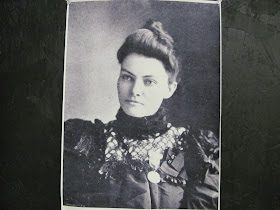Immediately after his conversion to Christ, during the early to mid 1870s, R. W. Officer cast his lot with the Baptists along the border dividing Middle Tennessee from northern Alabama and Mississippi. In that region, he served as a preacher and missionary for the Liberty Baptist Association. The Association was affiliated with a highly-sectarian group of Baptists who looked to preachers who had the blessing of J[ames] R[obinson] Graves, and who subscribed to his journal, The Baptist.
In time, Officer would publicly be rejected by some in that group, including their impressive leader, Graves. While still with the Baptists, Officer was sometimes derided as a "Campbellite." Eventually, he would be adopted by the Churches of Christ.
Historians have puzzled over Officer's religious views and identity. Besides the Bible itself, what were the influences in his life? It appears that during the time of his transition, Officer was taught and mentored by a handful of leaders among the Churches of Christ. These included Jesse Turner Wood, Murrell Askew, and perhaps also T. B. Larimore. But above all, the man who led and encouraged young Officer was Dr. N. B. Wallace, Sr. of Limestone County, Alabama. A quarter century after he first met Wallace, R. W. Officer wrote the following obituary for the Gospel Advocate.
* * * * * * * * * *
My father in the gospel, Dr. N. B. Wallace, heard the call, Enter thou into the joy of thy Lord, and accepted the invitation on the evening of December 27 last. He first saw the light of day near Decatur, Ala., on February 28, 1828. He obeyed the gospel at the tender age of seventeen years, graduated at the age of twenty-one years in Cincinnati, and spent his time for the good of others in the practice of medicine and preaching the gospel. Death can never mar the beauty of the life he lived. Its terror was at a distance; when unmasked, it showed to him a smiling face. The dome of thought, the palace of the soul, sleeps quietly at Athens, Ala. Dr. A. C. Henry and Brother Miller were with Sister Wallace, the dear children, relatives, and friends to comfort them with the blessed promises of our Redeemer. The fact that the spirit has returned to God, who gave it, and that the light of an eternal day is his, and joy and gladness for evermore, is a gentle reproof to pale sorrow that sits weeping at the home of our noble dead. We are glad that the shadow that death has cast over the souls of the living cannot dim the light of hope or frustrate that faith that overcomes the world. Like the flower that goes to sleep with the setting sun, he closed his eyes, and death was done; for to him it had no sting, and by faith in Christ the grave had lost its victory. Death waits on all, but waits for none. Let us be ready, as he was, to accept the invitation to come up higher. The day he was taken sick he turned to his faithful wife and said: Ada, the parting will be sad. The parting is over now; in gladness, hope for the meeting over there. He was called to the mansion prepared at eight o'clock in the evening. Think not of the dead, but of the living; for he lives with God and the angels. Let the thoughts of sadness sleep with him, and rejoice evermore in the light of the hope of the redemption of our bodies.
There is never a day so dreary
But God can make it bright;
And unto the should that trust him,
He giveth songs in the night.
There is never a path so hidden
But God will show the way,
If we seek for the Spirit's guidance,
And patiently watch and pray.
There is never a cross so heavy
But the loving hands are there,
Outstretched in tender compassion
The burden to help us bear.
There is never a heart that is broken
But the loving Christ can heal,
For the heart that was pierced on Calvary
Doth still for his people feel.
There is never a life so burdened,
So hopeless, and so unblessed,
But may be filled with the light of God,
And enter his promised rest.
There is never a sin or a sorrow,
There is never a care or a loss,
But we may carry to Jesus,
And leave at the foot of the cross.
What more can we ask than he's promised?
And we know that his word cannot fail--
Our refuge when storms are impending,
Our help when temptations assail;
Our Savior, our Friend, and Redeemer;
Our portion on earth and in heaven;
For he who withheld not his own dear Son
Hath with him all things freely given.
R. Wallace Officer, Atoka, I.T.
Gospel Advocate, January 26, 1899, p. 63.

